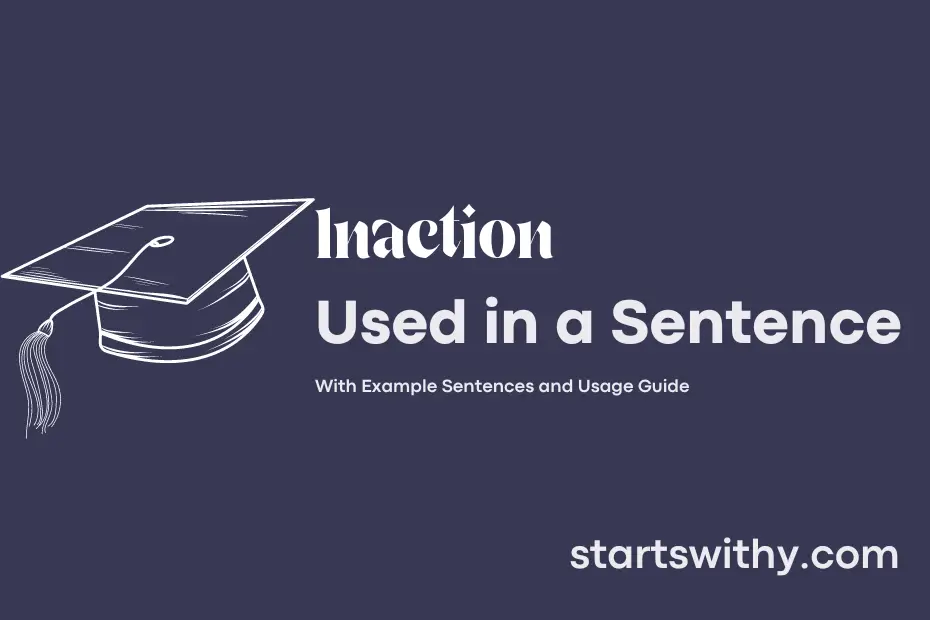Have you ever heard the saying, “inaction speaks louder than words”? Inaction refers to the lack of action or decision-making in a particular situation.
When someone engages in inaction, they are choosing not to take any steps or make any choices that could potentially change the outcome of a given scenario. This passive approach can often have significant consequences, as the lack of action can sometimes speak volumes about one’s intentions or priorities.
7 Examples Of Inaction Used In a Sentence For Kids
- Inaction is when you don’t do anything.
- We shouldn’t choose inaction when we can help others.
- Sometimes inaction can make things worse.
- It’s important to think before we choose inaction.
- Let’s not be afraid of inaction, let’s take action instead.
- You can make a difference by avoiding inaction.
- Remember, inaction is a choice too, so choose wisely.
14 Sentences with Inaction Examples
- Inaction in completing assignments can lead to poor grades.
- It is important to avoid inaction when it comes to attending lectures regularly.
- Inaction in applying for internships can hinder your professional growth.
- Skipping group study sessions can result in inaction in understanding complex subjects.
- Procrastination often leads to inaction in preparing for exams on time.
- Ignoring emails from professors can result in inaction in getting important academic updates.
- Socializing excessively can lead to inaction in participating in extracurricular activities.
- Failing to seek help from mentors can result in inaction in developing career skills.
- Neglecting physical fitness can lead to inaction in maintaining overall well-being.
- Being indecisive can result in inaction in making important choices for your future.
- Avoiding networking opportunities can result in inaction in building a strong professional network.
- Constantly comparing yourself to others can lead to inaction in focusing on your personal growth.
- Seeking validation from others can result in inaction in pursuing your true passions.
- Overcommitting to various activities can lead to inaction in taking care of your mental health.
How To Use Inaction in Sentences?
To use the word “inaction” in a sentence, follow these simple steps:
-
Understand the meaning: Inaction refers to a lack of action or activity, a state of doing nothing or avoiding taking any steps or decisions.
-
Identify the context: Think about a situation where there is a need for action but nothing is being done. It could be a personal decision, a societal issue, or a work-related problem.
-
Construct the sentence: Begin by setting the scene and introducing the context. For example, “Despite the urgency of the matter, his continued inaction only worsened the situation.”
-
Place “inaction” in the sentence: Position the word “inaction” where it best fits and makes sense in the sentence. Remember, it is used to emphasize the lack of action or effort.
-
Review for clarity: Make sure the sentence conveys the message you intend and that “inaction” is appropriately used to express the concept of doing nothing.
-
Practice using in different contexts: Experiment with incorporating “inaction” in various sentences to become more comfortable with its usage.
In summary, remember that the word inaction is used to describe a state of inactivity or a lack of action. By following these steps and practicing, you can effectively incorporate “inaction” into your writing and communication.
Conclusion
In conclusion, instances of inaction can have significant consequences, leading to missed opportunities or worsening situations. As seen in the examples highlighted throughout this article, failure to act can result in negative outcomes such as stunted personal growth, deteriorating relationships, and ineffective leadership. Procrastination, indecisiveness, and passivity are all forms of inaction that can hinder progress and achievement.
Recognizing the importance of taking deliberate action is essential for personal and professional success. By actively addressing challenges, making decisions, and executing plans, individuals can overcome obstacles and reach their goals. Embracing a proactive mindset and cultivating a habit of decisive action can help avoid the pitfalls associated with inaction and lead to a more fulfilling and productive life.



